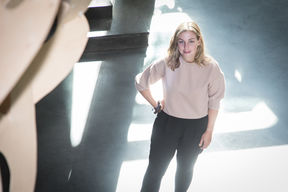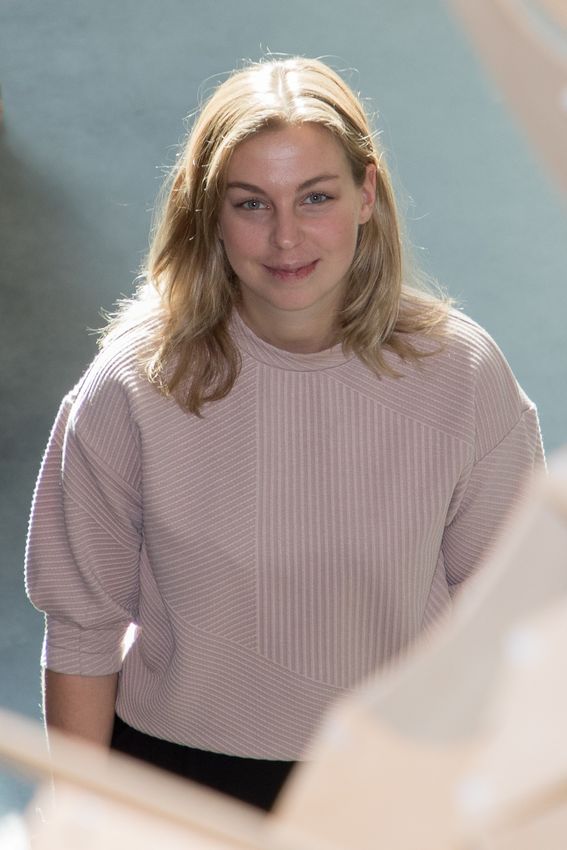An 'info student' can teach crowdfunding to entrepreneurs in slums and coding to secondary pupils

Design of digital services. Influence of socio-cultural factors. The relationship between humans and technology. These are things that Niina Arvila combined in her diploma work as part of the Fusion Grid research project. ‘I was particularly interested in how cultures influence the introduction of technologies and why an application that works well in Finland may not feel logical to someone in a different culture,’ says Arvila.
Fusion Grid is a joint research project of Aalto University, Lappeenranta-Lahti University of Technology, Nokia, Green Energy Finland and The University Properties of Finland. The goal of the project was to import a functioning telecommunications network and electric grid to areas, where building a heavy telecommunications infrastructure would be unprofitable, especially in small communities of poor countries. The project has received a funding of EUR 1.5 million from Business Finland. Aalto’s representatives included Arvila, Professor at the Department of Computer Science Marko Nieminen, doctoral candidate Pietari Keskinenand Visiting Researcher Karin Fröhlich.
Arvila, who joined the project in autumn 2018, is an 'infolainen', i.e. 'info student', meaning that she has studied in the Information Network degree programme. She majored in User-Centred Design.
Her work focused on researching the possibilities that electricity and the internet offer small business owners in poor countries. The topic of the diploma work was narrowed down to how entrepreneurs of such communities can be taught about crowdfunding campaign skills and how their awareness of crowdfunding possibilities could be increased.
During the project, Arvila arranged, for example, a training week on crowdfunding in Namibia together with a local university. Participants were small business owners, who live in slums. ‘Generally, they are faced with the problem of acquiring initial capital for their businesses, since the majority of their finances are spent on daily living costs. Especially for those who live in the more secluded areas or the slums, obtaining a loan from the bank is challenging.’
Niina ArvilaEspecially for those who live in the more secluded areas or the slums, obtaining a loan from the bank is challenging
The goal of the project was to spread information on crowdfunding to a group of entrepreneurs in the area, so that they might pass this information on further. The results reveal that the training week is an excellent way to increase awareness of crowdfunding in a short amount of time, but not a very lasting solution in the long run.
‘Learning new operating models is challenging, and therefore studying should be supported even after the training week. In the future, it would be good to explore how this training could be maintained with digital learning materials, for example.’
Reaching Aalto after gap years and economics studies
Arvila did not begin her studies at Aalto until four years after graduating from upper secondary. She was ‘good at everything,’ but not particularly excited about any specific subject. In upper secondary, she studied extended mathematics, which advanced faster than regular advanced mathematics. Yet Arvila did not receive the best grades as a student and her teacher made her believe that she would not be admitted to study a technical subject at Aalto. As such, she never even applied.
After two gap years, Arvila began to study economics at the University of Helsinki. It was interesting, though at the same time, she longed for a more concrete approach. She ultimately convinced herself to send an application to Aalto’s Information Networks degree programme, which had a human angle on technology that she found particularly appealing – and was admitted to the programme.
At Aalto, Arvila was especially keen on the possibility of being made a course assistant and summer-season research assistant early on in her studies. Starting students are provided with plenty of support for coding. There is also an abundance of group works, enabling student to develop their collaboration and performance skills, much-needed assets in working life. ‘Group works taught us how to work with different people, become committed in things and take responsibility within a group while experimenting with different roles.’
Niina ArvilaYou can really see that your work possibly makes a difference in someone’s life
Arvila discovered her interest in the subject of her diploma work as a result of a six-month study exchange in Namibia. Fusion Grid provided an opportunity to do things that genuinely help those in need. ‘You can really see something possibly making a difference in someone’s life.’
‘At Slush, I’ve discovered that everyone doesn’t understand what I’m talking about’
Alongside her studies, Arvila also worked at technology and growth event Slush. The event has been arranged in Helsinki autumns since 2008. During this time, it has transformed from a gathering of 300 people to the world’s leading start-up event that sees 25,000 participants annually.
Arvila was a UX Designer in Slush’s product team. The work balanced her life as a student busy with a diploma work while teaching her a great deal on teamwork, for example. Some of Arvila’s colleagues were self-taught coders, while others possessed educational backgrounds entirely different from hers.
‘At Info, everyone thinks with a similar thought pattern: each understands the basics of user-centred design and is interested in it. At Slush, I discovered that everyone doesn’t understand what I’m talking about or have the same starting premises for thinking as I do.’
For two years, Arvila also taught coding for secondary pupils in Helsinki’s Munkkiniemi. The after-school coding club was arranged for pupils once a week. ‘I loved seeing how excited they were about the training how they used their free time to be a part of it.’
In fact, the popularity was so great that when the coding school was on a summer break in summer 2018, making the secondary pupils somewhat unhappy, Arvila had the pupils complete the Aalto University’s Open University course on Python. She contacted the course’s professor and acquired funding from Aalto Junior to cover the costs of the pupils’ studies.
‘I’ve always been good at teaching and explaining things to other people. I was the person who explained math assignments to friends. My teachings got through to them better than the teacher’s.’
Arvila graduated as a Master of Science in Technology. She was interested in working with product development while helping other people and the world. ‘I’d like to work in a project that sought to develop applications for those in need, for instance. There are quite a few several interesting apps related to e.g. mental health these days.’
In the end of her studies she started at Wolt as a trainee working on an app and she has been working there with various tasks as a Product Lead since her graduation 2020.

Niina Arvila
Education: Bachelor of Social Sciences (Economics) from the University of Helsinki and Bachelor and Master of Science in Technology (Information Networks) from Aalto University
Lives and born in Helsinki
Greatest professional achievement: My entire academic path. ‘I’m pretty proud of the fact that I’ve graduated from the University of Helsinki as well as Aalto University – both are high-level educational establishments. I’ve succeeded very well in my studies and been able to work on different projects, even publish articles before graduating.’
Has also
Began playing football as an adult. ‘I had always wanted to be able to play football, something that’s always played at cabin trips and recreational events. Pietari (Keskinen) encouraged me to join football club HJK’s football school. Sometimes it’s still awful to go there, as I’m not very good, but it’s an invitation to surpass myself every week.’
Travelled from Beijing to Moscow by train via Mongolia and Siberia. ‘My friends and I did the Trans-Siberian trip in the summer: we first flew to Beijing, where we hopped on a train to Mongolia. The trip continued to Lake Baikal and then Moscow. We would stay on the train for up to four hours at most. No internet or telephone service at all – definitely one the most relaxing experiences of my life!’
Bought a sailing boar and then learnt to sail. ‘During the last year of studies, I was a bit easily led and decided to buy a small, old sailing boat together with my friends. I had only sailed once, so becoming a sailboat owner also meant having to learn sailing. Owning a boat has been fun: you learn something new every day and get to do things with your hands, such as varnishing and cleaning old surfaces.’
Read more news

OpenLearning additional maintenace downtime on Wednesday, 11 March from 9:00 AM to 12
Service break in OpenLearning 11 March at 9 to 12.
The proxy server for remote access to e-resources is changing
If you have problems using e-resources, try accessing the e-resource using VPN connection.
A sustainable city is also age-friendly
Cities must involve older adults more strongly in the planning of the urban environment.






